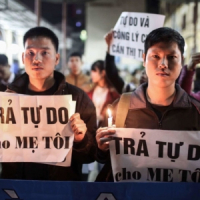New restrictions on freedom of expression in Vietnam
Vietnam has enacted a raft of new restrictions on political speech, Project88 said in a report published today.
After hardliners took control of the Communist Party of Vietnam (CPV) in 2016, they enacted political resolutions to maintain party hegemony, which established a nationwide network of brigades to police online discourse. The government was quick to follow, passing laws to control online speech and the press. And over the last five years, the police have shut down the only independent journalists’ association, publishing house, and anti-corruption organization operating in the country.
“New restrictions on freedom of expression in Vietnam” documents the extraordinary effort that Hanoi has exerted to control political speech. In recent years, the government has developed an elaborate policy framework that limits political speech in the digital sphere. The laws which have helped establish this censorship apparatus include the Cybersecurity Law, the Law on the Press, the Law on Information Technology, and the Law on Telecommunications, as well as numerous implementing decrees.
These laws build on an existing framework of criminal and administrative penalties that restrict freedom of expression in the country. In addition to these legal restrictions, the country’s police also use a range of extra-legal measures to limit speech. These restrictions make it nearly impossible for people to speak out or advocate for change.
Project88’s report argues that many aspects of Vietnam’s new policies on speech violate human rights law. These policies are overly broad and contain vague language, which gives government officials the discretion to determine what topics are off-limits. And what topics are forbidden can change at a moment’s notice. In the last few years, for instance, discussions about the country’s energy policy and labor rights have been criminalized, creating a chilling effect that encourages self-censorship.
Despite the country’s professed commitment to uphold the right to free expression in its constitution and in numerous human rights agreements, Vietnam has instead intensified its efforts to suppress freedom of expression. But the people of Vietnam, like all people, have the right to voice their opinions and access information free from persecution, censorship, and surveillance.
Commenting on the report, Project88’s co-director Ben Swanton said, ‘the report documents how in recent years Hanoi has increasingly enacted impermissible restrictions on freedom of expression, restrictions that are part of a new wave of repression that is limiting the rights of ordinary people to form associations, advocate for changes in policy, and protect the environment‘.
Download the report here.



